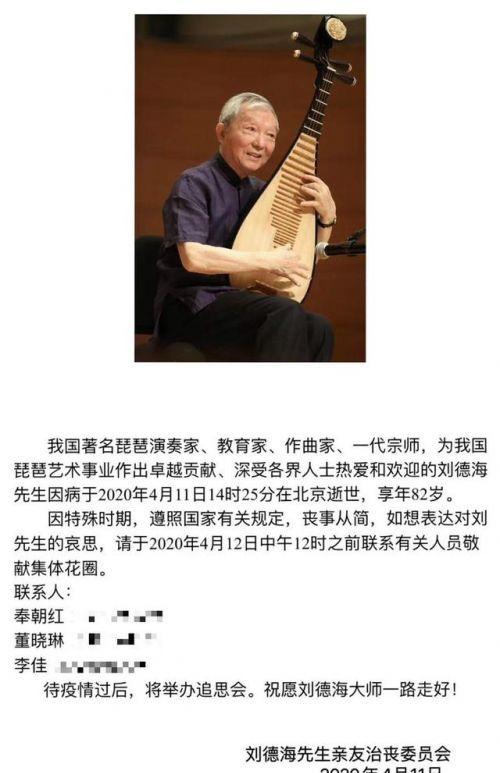On the afternoon of April 11, a message of "the death of pipa master Liu Dehai" spread across the Internet. Subsequently, a Red Star News reporter confirmed the news from a student of Liu Dehai. "I also learned of the teacher's death this afternoon, and now I am preparing to go to Beijing to send the teacher on his last journey." It is understood that Liu Dehai, a famous pipa player, educator and composer, died of illness in Beijing at 14:25 on the afternoon of the 11th, at the age of 82. Liu Dehai has come to Rong many times to perform before his death, and he likes Chengdu very much.

"We also received the news of the teacher's death this afternoon, very suddenly." A student who had studied with Liu Dehai for many years told Red Star News, "The teacher was not very comfortable during this time, and he was hospitalized intermittently, but he did not expect that he actually left us." Liu's student is very sad and is now packing her bags and preparing to take the latest flight to Beijing.
The Red Star News reporter also learned that teacher Liu Dehai accidentally slipped a few days ago, and has been unconscious since then, and has not woken up again.
Born in Shanghai on August 13, 1937, Liu Dehai learned pipa, erhu, flute, three strings and other ethnic instruments from an early age, laying a solid foundation and showing outstanding musical talent. In 1954, he studied under the pipa player Lin Shicheng and received the true biography of Mr. Lin. In 1957, he was admitted to the Central Conservatory of Music, and on the basis of the Pudong school's playing skills, he learned and consulted Mr. Cao Anhe of the Chongming school, Mr. Sun Deyu of the Shanghai Wang school, and Mr. Yang Dajun, the representative figure of the Pinghu school.
In 1973, Liu Dehai, Wu Zuqiang and Wang Yanqiao collaborated on the creation of the pipa concerto "Little Sisters of the Prairie", which was the first large-scale concerto of pipa.
Since 1979, Liu Dehai has collaborated with conductor Seiji Ozawa and the Boston Symphony Orchestra three times to perform "Little Sisters of the Prairie" and other music. Liu Dehai was also the first Chinese musician to work with the Berliner Philharmonic Orchestra. From 3 to 5 February 1981, Huang Yijun conducted three concerts by the Berliner Philharmonic Orchestra, including Borodin's "On the Steppes of Central Asia", the Pipa Concerto "Little Sisters of the Steppe", and Dvořák's Ninth Symphony "From the New World". This is the first time that a Chinese conductor has conducted the Berlin Philharmonic Orchestra, and Huang Yijun is also the first conductor to play the works of Chinese composers in the Berlin Philharmonic Orchestra. At that time, "Little Sisters of the Prairie" was performed twice, and it was Liu Dehai who played the solo role.
As a representative figure of contemporary pipa performance, Liu Dehai constantly explores the innovation of pipa fingering, and has adapted songs such as "Liuyang River", "Upside Down Curtain", "Distant Guests Please Stay", among which the most famous adaptation is undoubtedly "Ten Faces Ambush".
In 1975, Liu Dehai shocked four people with a self-composed and self-played "Ten Faces Ambush". "The normal heartbeat is 72 times per minute, and when I played "Ten Faces Ambush", I used four strings to fight with an army of 100,000 people, and my heartbeat was more than 100 times per minute." Liu Dehai once said this.
Decades of practice that integrates performance, creation, theory and teaching have enabled Liu Dehai to have his own unique and profound understanding of Chinese national music. He also gave too much help to young folk music players.
"You play the lute but don't necessarily like it, it may be that your parents asked you to play it." In the process of learning, you can enjoy as much pipa music as possible and slowly cultivate feelings for this spiritual 'wood'. Liu Dehai once said to the students, "The 10 fingers of the left and right hands must be practiced every day, and it is not possible to practice without practicing for a day." It can be said that pipa musicians suffer the most. If you are determined to take the professional path and accompany the pipa for life, then you will have to suffer for a lifetime. If you want to achieve great success in your career, you must suffer great hardships. For various reasons, you can give up the pipa halfway, but you can't give up this principle of doing things. ”
May the master go all the way.
Red Star News reporter Ren Hongwei
Source: Red Star News